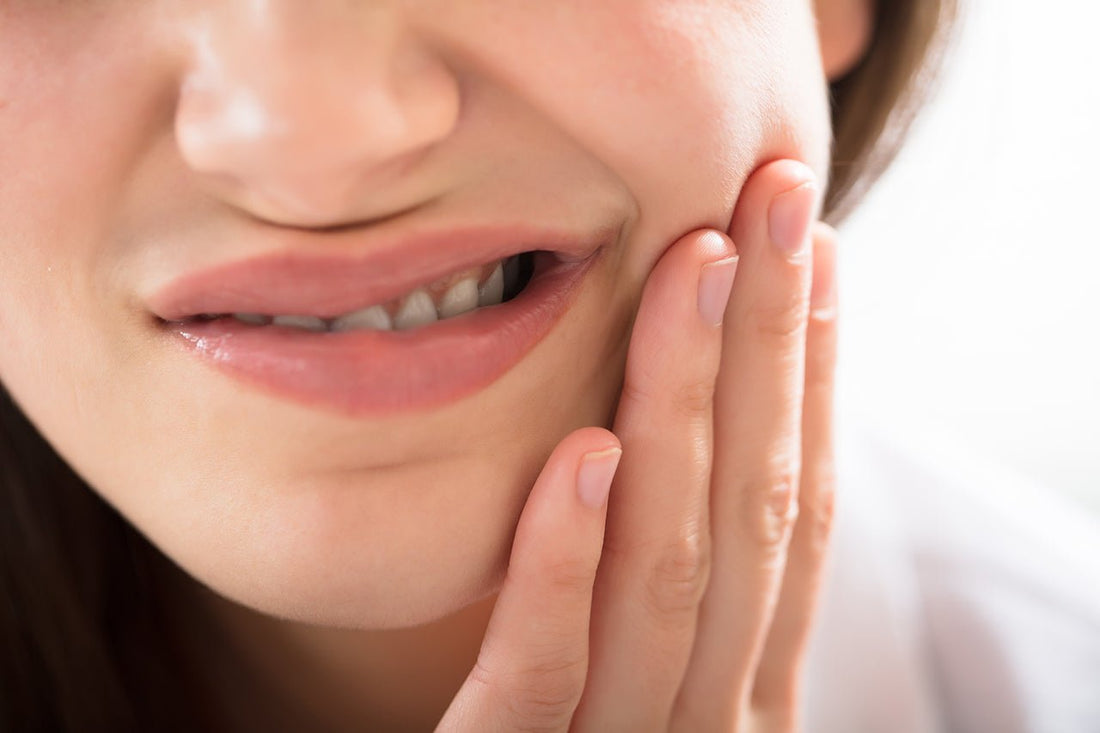The Causes of Sensitive Teeth and Comprehensive Solutions to Overcome Them

The Causes of Sensitive Teeth and Comprehensive Solutions to Overcome Them - Enzim Singapore
Experiencing discomfort or sharp pain when consuming hot, cold, sweet, or acidic foods is a common indicator of tooth sensitivity. Sensitive teeth, also known as dentin hypersensitivity, occur when the inner layer of the tooth, called dentin, becomes exposed. This layer contains tiny channels called dentin tubules that are directly connected to the tooth’s nerves. When external stimuli such as cold air, food, or drinks make contact with these exposed tubules, it triggers discomfort or pain.
Understanding the root causes of sensitive teeth can help you take the right steps to manage and alleviate the discomfort. Here’s an in-depth look at the causes and a detailed guide to managing tooth sensitivity.
Causes of Sensitive Teeth
1. Exposed Dentin Tubules Due to Worn Tooth Enamel
The enamel is the hard outer layer that protects the softer dentin underneath. However, when the enamel wears down, the dentin becomes exposed, leading to increased sensitivity. Enamel erosion can occur due to:
- Teeth grinding (Bruxism): Grinding your teeth, especially during sleep, can gradually wear down the enamel, exposing the dentin. The force exerted during grinding can also cause micro-fractures in the teeth, contributing to sensitivity.
- Frequent teeth whitening (Bleaching): Overuse of teeth-whitening products can weaken the enamel, as the bleaching agents may strip away some of its protective properties.
- Acidic foods and drinks: Consumption of acidic substances, such as citrus fruits, sodas, and vinegar-based foods, can cause the enamel to erode, exposing the dentin. Acidic byproducts from bacteria in the mouth can further accelerate this erosion.
2. Gum Recession (Gingival Recession)
Gum recession is a common cause of sensitive teeth, as it exposes the roots of the teeth, which are not protected by enamel. Gum recession can be triggered by:
- Continuous gum inflammation (Periodontitis): Chronic gum disease can lead to the gradual recession of gum tissue, exposing the tooth roots and resulting in sensitivity. In severe cases, this can also lead to bone loss and tooth instability.
- Over-brushing or brushing with too much force: Using a hard-bristled toothbrush or brushing your teeth too aggressively can damage both the enamel and the delicate gum tissue, causing the gums to recede over time. This type of gum recession often results in exposed tooth roots, leading to heightened sensitivity.
3. Cavities, Cracked Teeth, or Worn Dental Fillings
- Cavities: When a tooth becomes decayed, the protective enamel is compromised, and the underlying dentin becomes exposed, leading to sensitivity. If untreated, cavities can penetrate deeper into the tooth, causing more severe pain and discomfort.
- Cracked or chipped teeth: Physical trauma to the teeth, whether from chewing hard foods or an accidental injury, can cause cracks or fractures. These cracks provide a direct path to the sensitive dentin or even the tooth pulp, resulting in sharp pain when exposed to stimuli like cold or heat.
- Worn dental fillings: Over time, dental fillings may wear out or become loose, leaving the tooth vulnerable to sensitivity. Old or damaged fillings can also create gaps, allowing bacteria to enter and cause further decay.
4. Oral Health Complications and Medical Conditions
Certain oral health conditions and medical treatments can also contribute to tooth sensitivity. These include:
- Gum disease (Gingivitis and Periodontitis): Inflammation of the gums can lead to gum recession and exposure of the tooth roots.
- Tooth decay: Advanced tooth decay exposes the dentin and pulp, causing pain and sensitivity.
- Post-dental procedures: Sensitivity may occur after certain dental treatments, such as deep cleanings, root planing, or tooth restorations, as the dentin may temporarily be more exposed during the healing process.
Solutions for Managing Sensitive Teeth
While sensitive teeth can be painful, there are a number of simple yet effective strategies to manage and reduce discomfort. Here’s a comprehensive guide to managing tooth sensitivity:
1. Adopt Gentle Brushing Habits
Improper brushing techniques can exacerbate sensitivity. To protect your enamel and gums:
- Use a soft-bristled toothbrush: A soft-bristled toothbrush is less abrasive on both the enamel and gums. It helps prevent further enamel wear and reduces gum recession.
- Practice gentle brushing: Avoid using too much pressure while brushing. Instead, use gentle, circular motions to clean your teeth without causing damage to the enamel or gums.
- Brush twice a day: Maintaining a consistent oral hygiene routine is key to preventing the build-up of plaque, which can irritate sensitive teeth. Brush for at least two minutes in the morning and before bed.
- Use proper brushing technique: Tilt the brush at a 45-degree angle toward your gum line and use short, gentle strokes. Avoid scrubbing back and forth aggressively, as this can wear down the enamel and cause gum irritation.
2. Choose the Right Dental Care Products
To manage tooth sensitivity effectively, it’s important to use specialised dental products designed for sensitive teeth:
- Toothpaste for sensitive teeth: Look for a toothpaste that contains potassium nitrate, an active ingredient that helps block the transmission of pain signals from the dentin to the nerves. Enzim 40 Plus toothpaste is an ideal choice for managing sensitivity, as it is formulated with potassium nitrate, along with active enzymes and proteins that help control bacterial growth. These enzymes promote overall oral health by preventing conditions that exacerbate sensitivity, such as dry mouth, mouth ulcers, and gum inflammation.
- Enzyme-based toothpaste: The active enzymes in Enzim toothpaste, such as lactoferrin, glucose oxidase, and amyloglucosidase, enhance saliva’s natural antibacterial properties, keeping harmful bacteria at bay. This not only reduces the likelihood of plaque buildup but also prevents conditions like gum disease and decay, which can contribute to sensitivity.
3. Avoid Trigger Foods and Habits
Certain foods and habits can worsen tooth sensitivity. By being mindful of what you consume and how you care for your teeth, you can protect your enamel and reduce the risk of sensitivity:
- Limit acidic foods and beverages: Acidic foods and drinks, such as citrus fruits, vinegar-based dressings, sodas, and wine, can wear down enamel and increase sensitivity. Try to minimise your intake of these items, or follow them with a glass of water to neutralise the acids in your mouth.
- Avoid extreme temperatures: Foods and beverages that are very hot or cold can trigger pain in sensitive teeth. If possible, avoid extremes in temperature, and opt for foods at room temperature to reduce the likelihood of discomfort.
- Refrain from teeth grinding: If you grind your teeth at night, consider using a mouthguard to protect your enamel from further wear. Grinding puts excess pressure on the teeth, contributing to cracks and enamel erosion, which heightens sensitivity.
4. Consider Professional Dental Care
If your sensitivity persists despite using at-home remedies, it’s a good idea to consult with your dentist. They can offer additional treatments, such as:
- Fluoride treatments: Fluoride can help strengthen enamel and protect against decay. Your dentist may recommend a fluoride gel or varnish applied directly to the sensitive areas.
- Dental bonding or sealants: In cases where enamel has worn away significantly, a dental professional can apply a bonding agent or a protective sealant to cover the exposed dentin and reduce sensitivity.
- Gum grafts: For severe gum recession, a gum graft procedure can be performed to cover exposed roots and reduce sensitivity.
5. Long-Term Oral Care with Enzim 40 Plus
Using Enzim 40 Plus toothpaste regularly can significantly help manage and reduce tooth sensitivity over time. These products are specifically formulated to:
- Regenerate gum tissue: Enriched with colostrum and allantoin, Enzim 40 Plus supports the healing of gums and helps reduce inflammation, promoting healthier gum tissue and reducing the risk of gum recession.
- Prevent bad breath and plaque: The active enzymes in Enzim toothpaste help control the bacterial growth that causes bad breath and plaque buildup, reducing the risk of gum disease and decay that contribute to sensitivity.
- Promote a healthy oral environment: By supporting the natural functions of saliva, enzim products create a balanced oral environment that helps prevent the causes of tooth sensitivity, ensuring long-lasting protection and relief.
Conclusion: A Comprehensive Approach to Managing Sensitive Teeth
Sensitive teeth can be uncomfortable, but with the right approach, you can manage the condition and enjoy better oral health. By understanding the root causes of sensitivity—whether it’s enamel erosion, gum recession, or tooth damage—you can adopt preventative strategies to protect your teeth.
Switching to gentle brushing habits, avoiding trigger foods, and using products designed for sensitive teeth, such as Enzim 40 Plus Toothpaste, will significantly reduce discomfort and protect your enamel. With regular use of these products, you can alleviate tooth sensitivity and promote overall oral health, allowing you to enjoy life without the pain of sensitive teeth.



